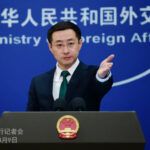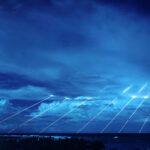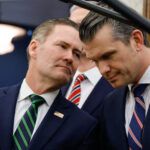Nukes, political violence, and environmental exploitation: The enduring relevance of Dune
By Erik English | April 15, 2024
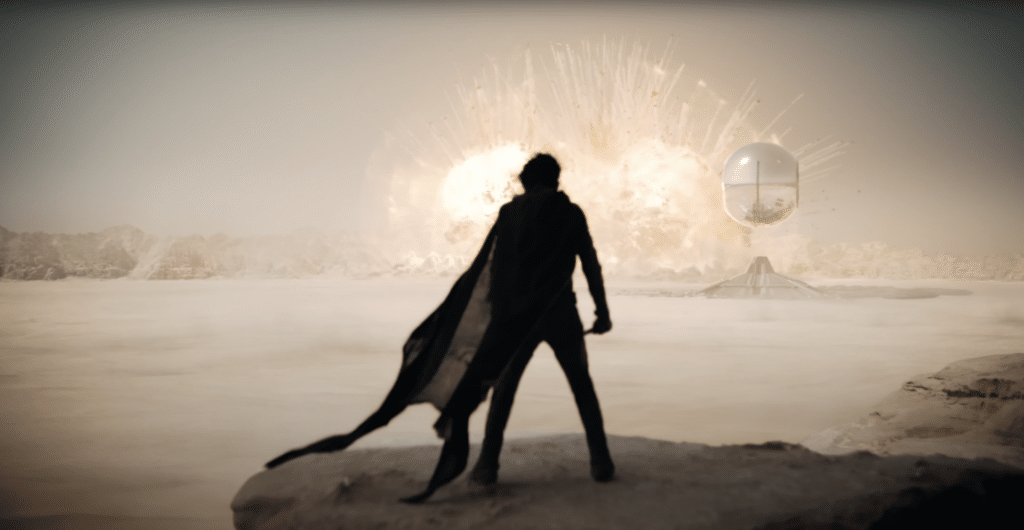 Paul Atreides (Timothée Chalamet) watches as atomic weapons are used to destroy the shield wall that protects the city of Arrakeen. Warner Bros.
Paul Atreides (Timothée Chalamet) watches as atomic weapons are used to destroy the shield wall that protects the city of Arrakeen. Warner Bros.
Editor’s note: This article contains spoilers for Denis Villeneuve’s Dune and Dune: Part Two and Frank Herbert’s Dune and Dune: Messiah; it also quotes text from other stories in Herbert’s Dune saga.
It’s very likely that by now, you’ve either seen or heard about director Denis Villeneuve’s latest film, Dune: Part Two. If you’re like me, you’ve seen it twice and may be considering a third viewing. The film is visually and auditorily spectacular and extravagant—a masterpiece of filmmaking that deserves to be seen on the biggest (and loudest) screen possible. But beyond the visual elements, there’s another reason I keep wanting to return to Arrakis: the relevance of the story of Dune to our world today.
Written by Frank Herbert and published in 1965, Dune was the first in a series of six books and intended to warn readers about the dangers of charismatic leaders. The main character, Paul Atreides (Timothée Chalamet), was modeled after John F. Kennedy, and the story’s first version appeared in Analog magazine a month after Kennedy’s death. In recounting Paul’s tragic journey, Herbert primarily examines power, corruption, and empire. Moreover, the context of Dune also grapples with many of the existential threats that face the world today: the use and morality of nuclear weapons, resource extraction and environmental degradation, and the risks of increasingly intelligent computers and artificial intelligence.
The latest two Dune films cut or minimize many of the elements included in Herbert’s original vision: the spacing guild that has consumed enough hallucinogenic drugs to turn them into fish-like beings with a monopoly on space travel, a future version of Islam that has spread throughout the universe, and CHOAM—the gigantic monopoly that governs commerce. What remains is a film that is focused primarily on power and the corruptibility of leaders, the dangers of religious extremism more broadly, and how the thirst for natural resources is used to justify extreme acts of war and environmental degradation—all of which are very familiar to the current residents of Old Terra (Earth).
A quick primer on Dune. 20,000 years in the future, humans have colonized the universe. Each planet is governed by “Great Houses” that control planets as fiefdoms, all of which are ruled by an emperor. The story’s main character is Paul Atreides, the son of Duke Leto Atreides, whose family is overthrown by the rival House Harkonnen but then returns to power by harnessing the military might of the planet’s local inhabitants, the Fremen.
Villeneuve’s first film is focused on roughly the first half of the book, in which the Atreides are given control of Arrakis—the only planet that produces the crucial resource known as melange, or “spice,”a resource that enables space travel and a clear allegory for oil extraction in the Middle East—and then betrayed by the Harkonnens. Dune: Part Two finishes the story, in which the Fremen, who have adapted to the harsh desert landscape patrolled by giant sandworms, take in Paul and Lady Jessica (Rebecca Ferguson). Aided by his romantic partner, Chani (Zendaya), and his mentor, Stilgar (Javier Bardem), Paul quickly rises through the ranks of the Fremen and achieves a godlike status which he uses to mobilize them in a war against the Harkonnens and, eventually, the emperor himself.
The Great Convention. Thousands of years before the events of Dune, humanity overthrew a race of artificially intelligent beings known as “thinking machines.” These computers were outlawed after the war, known as the Butlerian Jihad, and humanity became reliant exclusively on spice, a hallucinogenic drug indigenous to Arrakis for computation. In Dune, spice enables the spacing guild to calculate routes through the stars and “mentats” to perform computerlike calculations in their head.
The Butlerian Jihad also precipitated the “Great Convention,” which prohibits the use of nuclear weapons on civilian populations—though virtually everything else is allowed in Dune. Control of the remaining nuclear weapons, known as “family atomics,” is left to the great houses, each of which maintains its own arsenal. After Paul gains access to the Atreides’ family atomics, he uses them to destroy the shield wall that protects Arrakeen from the desert’s giant sandworms, allowing the Fremen to invade the city.
While the story’s broad strokes remain the same, the book and movie discuss these weapons very differently. John Erath at the Arms Control Center recently pointed out that the treatment of nuclear weapons in the book reflected the strategic thinking at the time. “As the protagonists prepare the final battle, they almost casually incorporate a nuclear strike into their planning to open the way for their troops. That is the only reference to nuclear weapons. During the Cold War, military planners routinely assumed that future conflicts would involve nuclear weapons and included their use in tactical and operational planning, so audiences of the time could have expected that ‘atomics,’ as Herbert referred to them, would be a logical part of the battle for [Arrakis].”
Villeneuve’s latest film treats these weapons much more seriously. The film spends some time finding the weapons and discussing their use, and descriptions of the arsenal as “enough to blow up the whole planet” are met with shock. The Great Convention forbids using nuclear weapons against humans, a notion not dissimilar to current policies around “sole purpose” that, supposedly, limit nuclear weapons to deterrence, i.e. to keeping others from using them. According to the Great Convention, using atomic weapons could be grounds for planetary destruction. Still, Paul calculates that the shield wall protecting the capital of Arrakis is a natural landscape and so exempt from the agreement, a technicality that he exploits.
Paul’s use of these weapons when the consequences of their use is so dire indicates the risks he is willing to take to achieve his goals. The Great Convention isn’t mentioned in the film, but Chani and Stilgar’s reactions and the reference to blowing up the planet are reflective of modern day discussions of nuclear escalation. In particular, the ongoing conflict in Ukraine has reignited discussions around the value and application of nuclear weapons, but Donald Trump also showed a willingness to consider nuclear weapons, and other countries are reconsidering their previous stances on their use.
The film, like the book, asks a lot of its viewers. The treatment of nuclear weapons requires one to remember the shield wall from the first film, seen briefly from the air as Paul enters Arrakis. It also requires the viewer to remember the shape of the weapons as they fly over Paul’s head to destroy the shield wall, allowing the sandworms to invade from the desert.
Part of this is due to Villeneuve’s style, which emphasizes visual story-telling over dialogue. This is risky in a story where the audience needs to have a clear view of Paul’s fallibility but is well-executed and set’s the stage for what comes next. In Herbert’s second installment of the saga, Dune: Messiah, Paul notes that his galactic jihad (rebranded as a holy war in the films) has killed 61 billion people, and he compares himself to Adolf Hitler and Genghis Khan. It leaves no doubt in the reader’s mind about Paul.
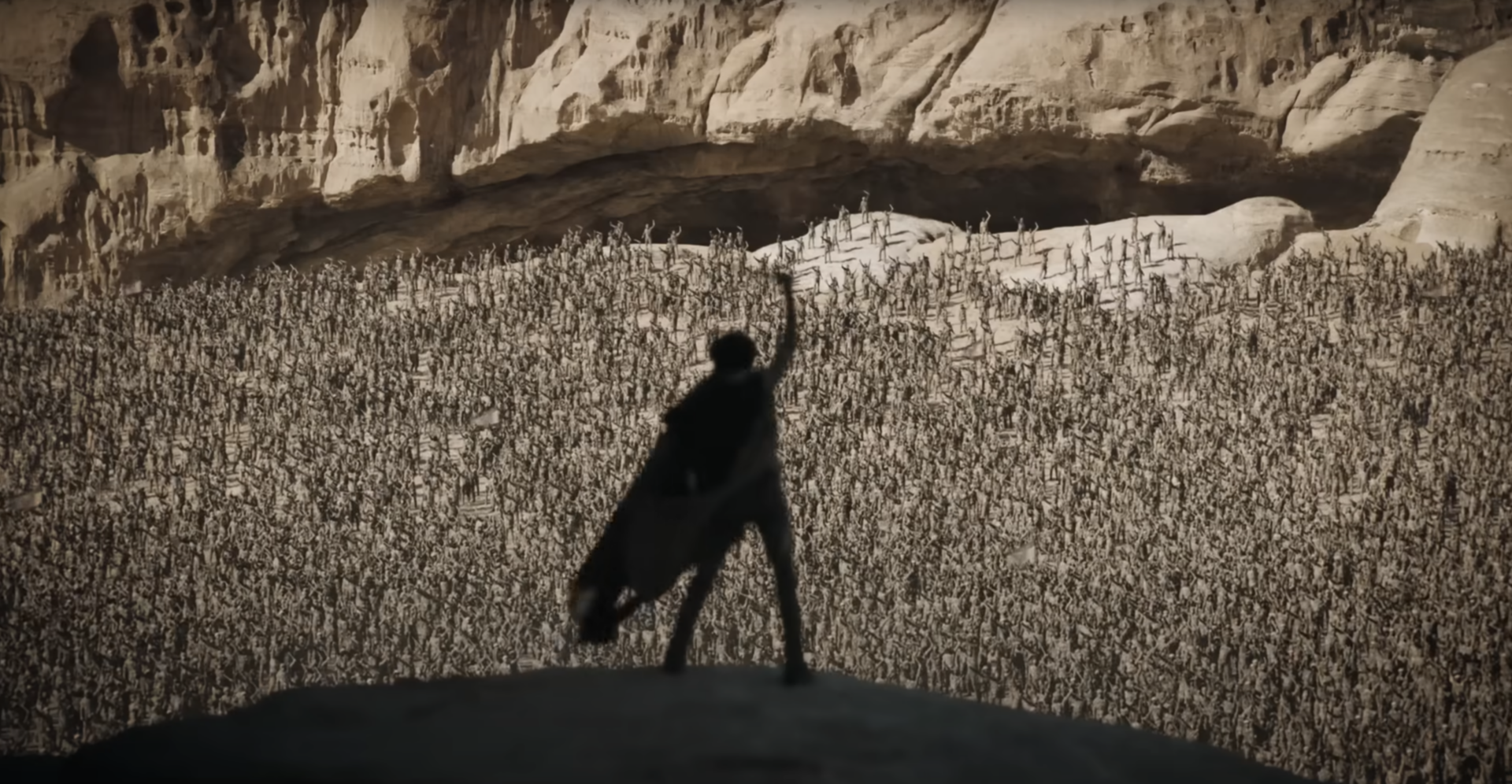
Bless the maker and his water. The fabricated religious prophecy Paul ostensibly fills is what allows him to rise to power. The Bene Gesserit, a religious order that manipulated genetics for centuries to genetically breed the most powerful being in the universe, has planted a prophecy among the Fremen that Paul was trained to fulfill. As part of this prophecy, the Fremen believe that an outsider will lead them to paradise—in practical terms, they seek to terraform the desert planet’s unforgiving environment into a lush garden. Once the Messiah arrives, they will do his bidding to achieve this prophecy.
Jean-Pierre Fortin, a professor of Practical Theology at the University of St. Michael’s College, wrote that “Herbert reformulates the analysis that Fyodor Dostoyevsky puts on the lips of his Grand Inquisitor in The Brothers Karamazov: Most citizens of democratic nation-states are all too eager to delegate the exercise of their free agency to avoid having to carry the burden of individual and collective responsibility and enjoy enduring peace, comfort, and security.” The Fremen are willing to sacrifice their autonomy to fulfill this prophecy, even though it is based on a lie planted by the Bene Gesserit and would entail a complete reversal of their lifestyle and traditions.
In the language of Dune, Paul is the Lisan al-Gaib, an Arabic phrase meaning “Tongue of the Unseen,” which the books translate as “Voice from the Outer World.” Fortin points out that the Fremen’s relationship with their dangerous desert home is part of their path to salvation. “The Messiah is the leader who will hasten the completion of the journey from survival in a hostile environment to a comfortable existence in a safe haven. As the setting for this holy quest, the desert planet Arrakis is conceived as the enemy of humankind and a testing and training ground for the faithful.” Paul’s authoritarianism is enabled by the Fremen, who trust him to master the environment and change the planet’s landscape to a more suitable and comfortable world.
Interest in authoritarianism is growing around the world. This is particularly troublesome this year, when over 50 countries will select their leaders and many candidates have already stated aims to undermine democracy.
Studies in 2016 found that support for authoritarianism was one of the most reliable predictors of support for Donald Trump. Since then, many of his supporters have come to see him as anointed by God to rule America. Treated seriously in the movie and in the novel, this kind of religious fervor can manifest as farce in the real world, as seen last month when Trump announced that he would be selling his own branded bibles for $60.
In India, Narendra Modi is using religious imagery to mobilize Hindu nationalists in the upcoming election. His party chief called him “the king of gods.” In Hungary, Viktor Orbán has used Christianity to legitimize his government and has become a model for right-wing political elites in the US.
Plot changes between the book and the movie make the danger of this religiosity more apparent. Instead of falling in line as a concubine and follower, Paul’s romantic partner, Chani, dismisses the prophecy that he is the Messiah, objects to Paul’s actions, and ultimately rejects him at the end of the film.
However, by this the time she abandons Paul, the change in the Fremen is profound. In the beginning of the film, the Fremen collect water from slain Harkonnens—using the fluid for survival. By the end of the film, the Fremen are burning the bodies instead, a dark indicator of how much they have already sacrificed and are willing to waste for their prophet.
Roots of Empire. As previously noted, Paul is a stand-in for John F. Kennedy, whom Herbert had called “one of the most dangerous presidents this country has ever had.” Herbert found Kennedy’s charisma particularly troublesome because his followers adopted a fanaticism around the figure rather than his ideas.
Instead, as author and historian Haris Durrani has pointed out, Herbert preferred Richard Nixon, who exposed the “corruption” of the presidency, and Ronald Reagan, whose background as an actor exposed the “artificiality” of the position. Speaking to Mother Earth magazine in 1981, Herbert said: “Nixon taught us one hell of a lesson, and I thank him for it. He made us distrust government leaders. We didn’t mistrust Kennedy the way we did Nixon, although we probably had just as good reason to do so. But Nixon’s downfall was due to the fact that he wasn’t charismatic. He had to be sold just like Wheaties, and people were disappointed when they opened the box.”
Much of Herbert’s distrust of government seemingly stems from the time before he wrote Dune, when he served as an aide to Republican Sen. Guy Cordon of Oregon. Cordon was chairman of the Senate’s Committee on Interior and Insular Affairs, today known as the Senate Committee on Energy and Natural Resources, which still has jurisdiction over energy policy, nuclear energy and nuclear waste, territorial policy, and “Native Hawaiian matters.” Before the establishment of the Select Committee on Indian Affairs in 1977, those matters were also part of the committee’s jurisdiction.
According to Daniel Immerwahr, a history professor at Northwestern University who wrote a fantastic essay on Herbert’s worldview and inspiration, Cordon observed the July 1946 atomic weapons tests at Bikini Atoll and was greatly interested in the submerged land that the US claimed off the coast of Micronesia. Herbert, then a speechwriter for Cordon, wrote, “Our new empire is the continental shelf.”
Herbert was still an aide to Cordon during the red scare of 1950s, led by Wisconsin Sen. Joseph McCarthy. Haris Durrani suspects that the experience of seeing Cordon, McCarthy (actually a relative of Herbert), and then-Senate Subcommittee on Investigations staffer Robert F. Kennedy “commiserating” after hearings on supposed communist infiltration of the US government disgusted Herbert so much that he wrote a scene about it in Dune: the banquet scene, which was removed from Villeneuve’s films.
Herbert’s time working in Congress was a formative experience and it’s possible to read Dune as a reaction to this experience, documenting Herbert’s disenchantment with US foreign policy. To Herbert, the people who are drawn to power are fundamentally corrupt. In Chapterhouse: Dune, Herbert wrote that, “[a]ll governments suffer a recurring problem: Power attracts pathological personalities. It is not that power corrupts but that it is magnetic to the corruptible.”
This is seen in the film after Paul has drunk the water of life, a more potent form of the spice drug, and gained his prescient abilities. At this point, Paul realizes that his hated enemy, Baron Vladimir Harkonnen (Stellan Skarsgård), is actually his maternal grandfather. The realization seems freeing and gives him permission to act on his worst instincts: “That’s how we’ll survive. We’ll be Harkonnens.”
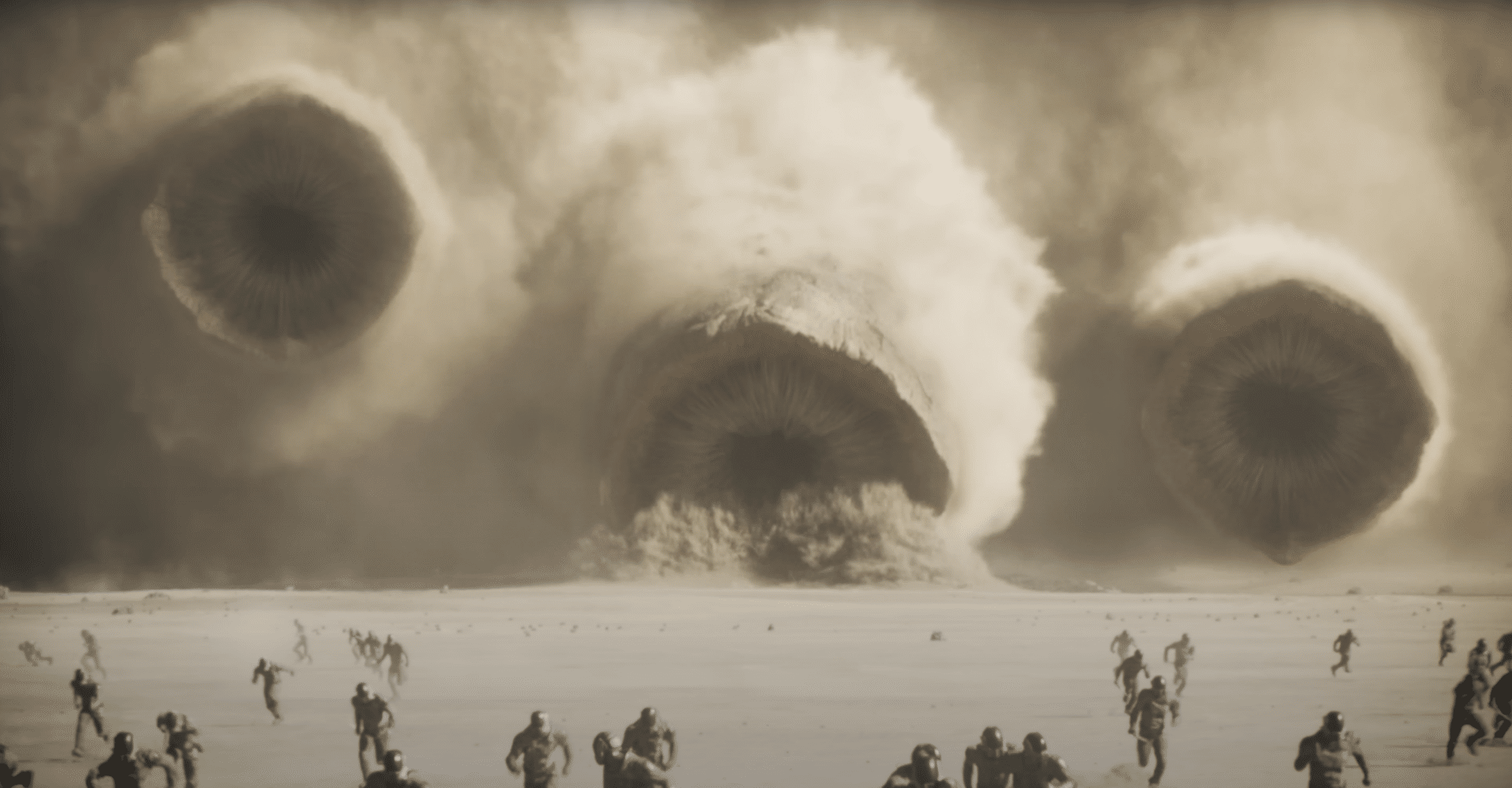
Techno-peasantry and fourth-world advocacy. So how did Herbert evolve from an aide to an imperial-minded senator and become an environmentalist concerned about resource extraction and environmental degradation? The essay by Immerwahr, the Northwestern University historian, looks closely at this issue.
In 1953, Herbert traveled to Florence, Oregon, to report on a US Agriculture Department project to plant grasses in sand dunes to limit their migration. His reporting on the dunes inspired him to begin writing a book that took place on a planet covered in sand dunes.
Between the book’s drafting and publication, Herbert became friends with Howard Hansen, a member of the Quileute Nation, a Native American tribe in the Pacific Northwest. Hansen shared stories with Herbert about the logging companies that were destroying tribal areas. The stories Hansen shared clearly had a profound impact on Herbert.
Immerwahr described the evolution of Herbert’s environmental and humanitarian views as part of the “fourth world” movement. He says, “Whereas Third World movements principally sought to seize control of foreign-ruled governments and win equality within the international system, Fourth World ones aimed for land rights, cultural preservation, and autonomy from national governments.”
Herbert’s views on nature were similar to his views around technology. In his interview with Mother Earth in 1981, Herbert described his philosophy of “techno-peasantry:” “It involves drawing support from technology, but doing so imaginatively. We have to ask the question, ‘What elements of technology should I use, and how should I use them?’ A peasant knows, you see, when and why to grab a shovel or a hoe. In the same way, we have to think out our own relationship to the complete environment, our own values and technological options, and make decisions consciously.”
The idea of retracting from technology is appealing, but it also feels naïve in our smartphone-obsessed culture, in which technology only seems to move forward, never backward.
The worm still turns. Nearly 60 years after publication, the Dune story remains relevant. The current technological moment—defined by billionaire efforts to colonize the solar system, advancements in artificial intelligence, and nuclear saber-rattling among world powers—is similar to the backdrop against which the Dune saga takes place. Unfortunately, Dune’s fundamentally cynical worldview about government ineffectiveness also endures. In 2020, Jordan Carroll wrote in the Los Angeles Review of Books that many far-right groups that embrace the novel see Paul as “the ideal of a sovereign ruler who violently overthrows a decadent regime to bring together ‘Europid’ peoples into a single imperium or ethnostate.”
It’s worth noting that while significant parts of Dune’s context seem familiar in today’s reality, some of the book’s backdrop has been cut from the last two Dune films, in an apparent nod to 21st century sensibilities. The homophobia that characterizes the Harkonnens has been removed from the story. Gone, too, is the overt Islamic characterization of the Fremen’s form of fundamentalism. Reasonable people can disagree whether this exclusion is erasure, the removal of an Orientalism that is no longer resonant, or an attempt to free the film of stereotypes to make the film more universally relevant. To me, what remains is a story that speaks of the dangers of religious fervor around political figures and concern about the weapons at their disposal.
Dune’s worldview is fundamentally cynical—but it’s heartening to know that while much of it remains relevant, much has also changed. Perhaps years from now, readers and viewers will see these discussions around nuclear weapons and environmental exploitation as a relic of the past. In Children of Dune, Lady Jessica says, “The future remains uncertain, and so it should, for it is the canvas upon which we paint our desires.” The world of tomorrow doesn’t need to adopt the failures of the past, but only if we heed its warnings today.
Together, we make the world safer.
The Bulletin elevates expert voices above the noise. But as an independent nonprofit organization, our operations depend on the support of readers like you. Help us continue to deliver quality journalism that holds leaders accountable. Your support of our work at any level is important. In return, we promise our coverage will be understandable, influential, vigilant, solution-oriented, and fair-minded. Together we can make a difference.
Keywords: 2024 election, dune, frank herbert, nuclear deterrance, nuclear weapons, oil, political violence, science-fiction, sole use
Topics: Analysis, Nuclear Risk



